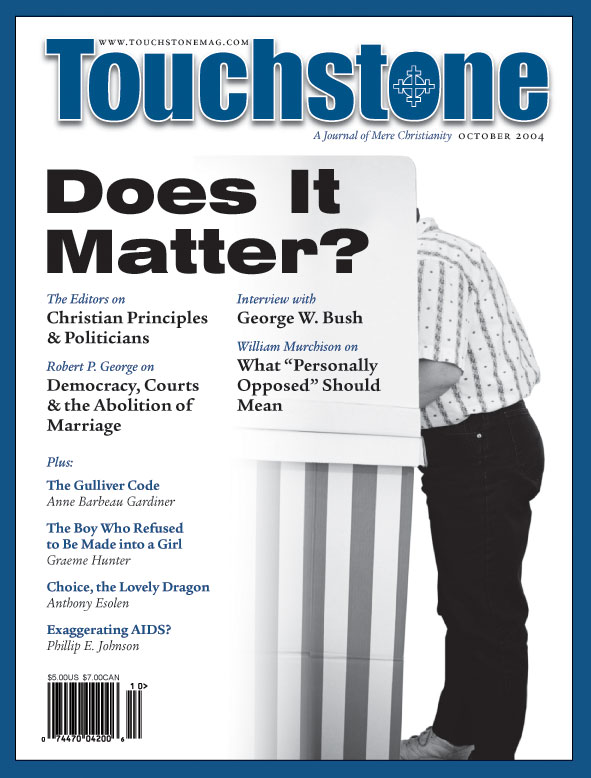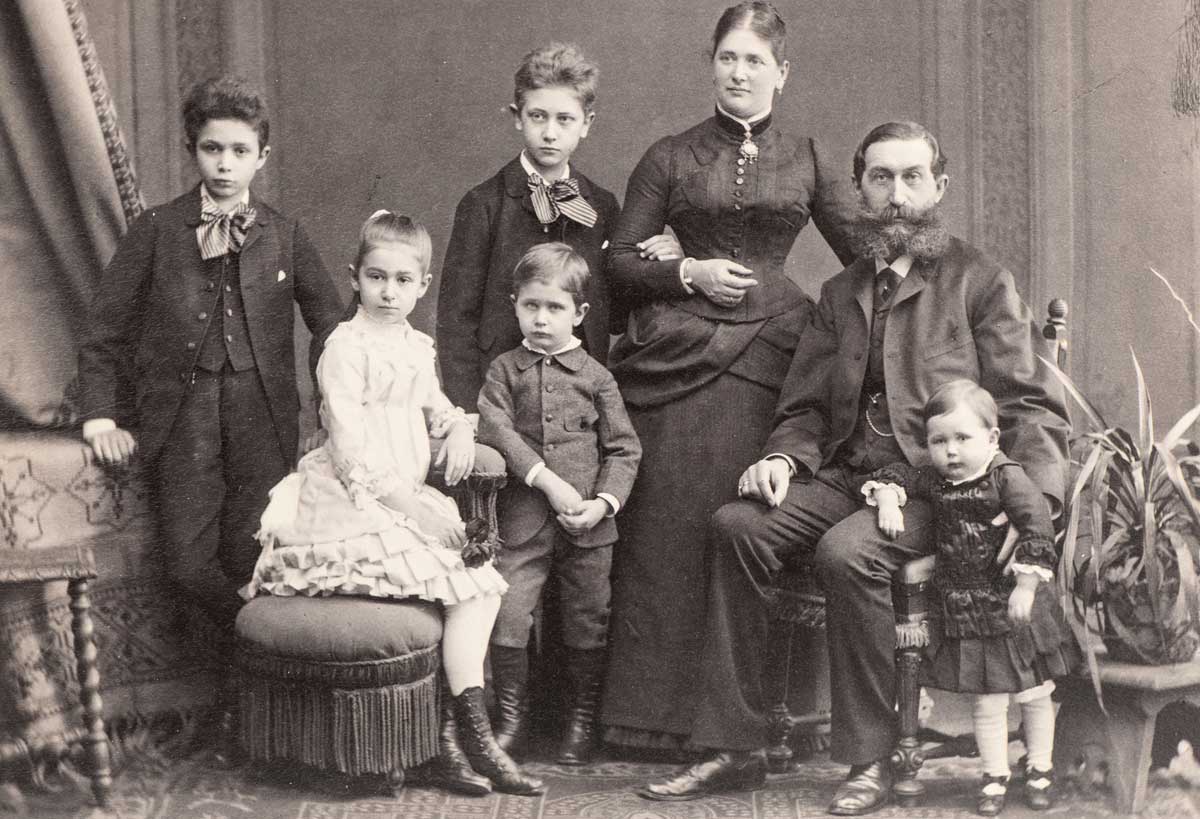First Things First
On the Two Values that Matter Most
by James M. Kushiner
The National Council of Churches recently published “Christian Principles in an Election Year,” which identifies “ten non-partisan, biblically based guidelines” for voters in this election year. What are the ten areas of concern? War/conflict, urban decay/poverty, foreign policy, economic justice, racial justice, environmental justice, immigration, health care, and criminal justice. The non-partisan guide makes no mention of “gay marriage” or sanctity of life issues such as abortion, embryonic stem-cell research, or euthanasia.
A recent editorial in a conservative Christian magazine did a little better in this regard, but still missed an important opportunity to uphold the Christian tradition. It addressed the question of Christians voting “to communicate biblical values to their government representatives.” Offering aid to the Christian who wants to vote conscientiously in the upcoming election, the editors chose six areas of “urgent concern”: religious freedom around the world, Middle East peace, expanding access to health care, fighting AIDS wisely, pro-life Supreme Court appointees, and defending marriage—in that order.
How they failed was by neglecting to prioritize their six issues or to explain why they included those issues as opposed to other crucial issues left unmentioned, such as embryonic stem-cell research, human cloning, and euthanasia.
Do the editors believe that there is no meaningful hierarchy of issues? By presenting the issues in the way they did, they effectively advocated what could be called a democratization of values or egalitarianism in ethics. If we ask which issues should most inform our voting, the answer is, take your pick from the list.
Since no candidate is better on all the items, such an approach would seem to leave us morally free to vote for any candidate who is strong on several of them while bad on several others. Which are which doesn’t matter, since they are all offered, without prioritization, as biblical values. The Christian conscience is free to choose what it likes in this moral and ethical cafeteria.
But the Christian tradition, rooted in Holy Scripture, shows clearly that two of the six are in a class of their own: They are timeless and foundational matters. The others are not. The Christian must try to understand the others in the light of timeless and foundational principles, but the way he thinks these matters are best addressed in this world is a matter of prudence, on which Christians can disagree, and indeed disagree radically. But the sanctity of human life and the sanctity of marriage are primary and fundamental biblical “values.” Genesis teaches this and Christ confirms it.
Pillars of Life & Marriage
This is clearly true of the sanctity of human life. In Genesis, while all other life is “brought forth” by the earth, man is directly formed by God. His very flesh bears the fingerprints of the Creator, and his soul is given from the breath of God. Man is a special God-made being, in his very flesh.
Further, while all life reproduces “after its kind,” man’s procreative mandate is unique. God creates woman for man and brings the two together under his hand and blesses the union, a one-flesh union that in Christian theology is more than biological; it reflects a deeper mystery of Christ and the Church.
And there is more: Not only is the substance of man sanctified by God, it is further sanctified by the flesh of Jesus Christ, flesh conceived by the power of the Holy Spirit and born of the Virgin Mary. Further, Christ gave his body on the Cross for the redemption of fallen Man, and not just a redemption from punishment for sin.
It is the redemption of man’s body from death itself. In the crucified and resurrected flesh of Christ lies the power of salvation for all flesh—for “all flesh will see the salvation of God.” Salvation for the Christian means the resurrection of the body, the very flesh that we bear, the very flesh God gave to Adam. After our bodies are raised and renewed, we shall, in that redeemed flesh, behold the Lord “face to face.”
What this means for the Christian is that he cannot fail to treat as sacred all human flesh, whether in the womb or outside it. Whether in embryonic form or disfigured by disease, mental illness, old age, or other malady, all human life must be protected.
Can a Christian citizen, then, ignore what the election of any candidate will mean for the trafficking in human flesh: killing embryos for stem cells, cloning human beings for stem-cell research, creating embryos for the purpose of obtaining “donor” organs? Is this issue really on the same level as a candidate’s views of the Middle East?
In the Old Testament there were those who consumed human life by sacrificing children to appease the gods or to get something from them, and God ordered the Israelites to deal with such people most severely. Societies that thus destroy human life for the purposes of human or agricultural fertility (Baal worship) stand under judgment. So do those that destroy human life to achieve economic prosperity, or health, or a desired lifestyle.
As to marriage, not only is it uniquely blessed with the divine presence and sanction in Genesis, but it is also referred to by Christ as the one-flesh union of man and woman and something that “God hath joined together.” And the first revelation of Christ’s glory in the Gospel of St. John is at the Wedding Feast of Cana. St. Paul refers to the union of husband and wife as a mystery. Finally, the Book of Revelation portrays the final redemption of mankind as culminating in the marriage supper of the Lamb.
While “traditional marriage”—one man, one woman—is not the consistent Old Testament practice, Christ makes it clear that it was God’s intention “from the beginning.” And all homosexual activity is condemned in both the Old and New Testaments. St. Paul in Romans 1 writes that homosexual practice is a sign of the deepest idolatry. Christian citizens today are being asked to take the extraordinary step of approving something that is strongly and unequivocally condemned in Scripture.
Getting Serious
What Christian citizens face in these two issues alone should make us realize why they take precedence over the other four items listed in that editorial, important as they are. On the issues of advancing religious freedom across the globe, fostering peace in the Middle East, expanding health-care coverage, and fighting AIDS, politicians (including the presidential candidates) differ not about the ends we are seeking, but about the best or most effective means to those ends. There is room for reasonable disagreement here. People (including Christians) of goodwill can come down differently on these issues without compromising any moral principle.
But on the life issues and marriage, the differences are about ends, not merely means. Christians of goodwill cannot reasonably differ about the obligation of law and government to protect innocent human life against abortion and embryo-destructive biomedical research, or the need to protect marriage by opposing its redefinition to embrace sodomitical relationships.
Were the sanctity of life and marriage not at stake, Christians would be free to vote based on their best understanding of the Christian view of the other four matters, always remembering that they were making difficult decisions about prudential matters.
In this election, social policies that will deeply affect human life and marriage are being decided upon. The upcoming elections will decide our next president, the make-up of Congress, and, indirectly, the make-up of the Supreme Court and the other federal courts. Among the issues on which American policy can change radically for good or for ill are:
• Abortion, including partial-birth abortion;
• Human cloning;
• The harvesting of stem cells and organs from human embryos and fetuses;
• Euthanasia;
• “Gay marriages”; and
• The public instruction of our children in these matters.
Moreover, other crucial issues come along with these. For example, Christians’ freedom to express their views in both the pulpit and the public square about the morality of “gay marriages” and homosexual acts (and to teach their children accordingly) will be affected, as the sexual innovators and activist judges promote “hate speech” laws that would penalize the expression of Christian opinion.
If we are serious about a just and humane society, we must defend marriage and human life above all, both in public and in private. All other matters are secondary. Not to put life and marriage first and not to let the candidates’ positions on them determine our vote is to become like the people of whom it was written, “They feared the Lord, but served their own gods” (2 Kings 17:33).
No amount of health insurance, of support for religious freedom in other countries, of ways to end the conflict in the Middle East, or of AIDS drugs will protect us from the short- and long-term consequences of supporting candidates who will not protect life and marriage. A society in which vulnerable human life is not protected and in which marriage is made irrelevant is a society that will not long continue to care for the freedom, peace, and health of others.
James M. Kushiner is the Director of Publications for The Fellowship of St. James and the former Executive Editor of Touchstone.
subscription options
Order
Print/Online Subscription

Get six issues (one year) of Touchstone PLUS full online access including pdf downloads for only $39.95. That's only $3.34 per month!
Order
Online Only
Subscription

Get a one-year full-access subscription to the Touchstone online archives for only $19.95. That's only $1.66 per month!
bulk subscriptions
Order Touchstone subscriptions in bulk and save $10 per sub! Each subscription includes 6 issues of Touchstone plus full online access to touchstonemag.com—including archives, videos, and pdf downloads of recent issues for only $29.95 each! Great for churches or study groups.
Transactions will be processed on a secure server.
more on America from the online archives
more from the online archives
calling all readers
Please Donate
"There are magazines worth reading but few worth saving . . . Touchstone is just such a magazine."
—Alice von Hildebrand
"Here we do not concede one square millimeter of territory to falsehood, folly, contemporary sentimentality, or fashion. We speak the truth, and let God be our judge. . . . Touchstone is the one committedly Christian conservative journal."
—Anthony Esolen, Touchstone senior editor













